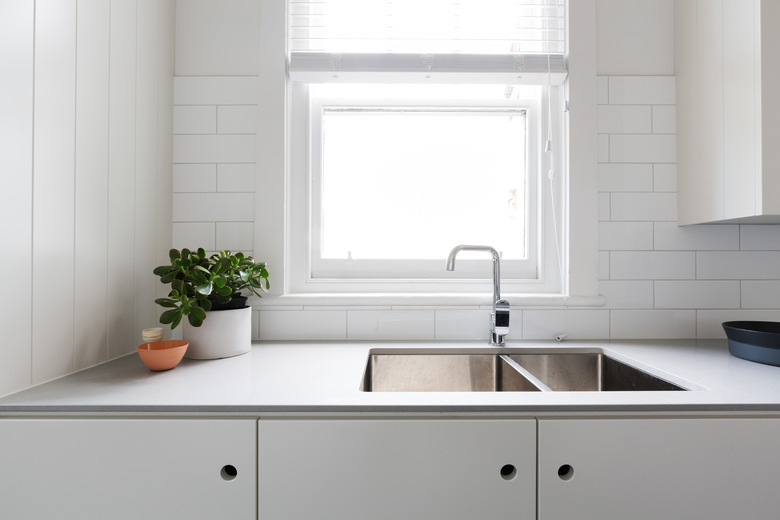How To Remove Rust Stains From A Laminate Counter
Of all the materials you could use to cover your kitchen counters, laminate is probably the most stain-resistant. The surface of laminate is either plastic or wood coated with plastic, and plastic is impervious to most staining agents. However, all bets are off if you leave your wet cast iron skillet sitting on the counter and it leaves rust stains.
Rust, like scale, doesn't usually come off with soap and water, although that's always worth a try. To remove rust from your countertop, you either have to dissolve it or scrub it off with a mild abrasive. The problem with using an abrasive, however, is that it could scratch the plastic coating.
Fortunately, you probably have a suitably mild abrasive in your kitchen cabinet. Both baking soda and salt will do the trick, provided you're willing to put in the effort. You can also use vinegar to dissolve the rust stain, but don't combine it with baking soda or you'll create a do-nothing paste that may make a satisfying foam but won't have any cleaning power.
Removing Rust Stains With Vinegar
Removing Rust Stains With Vinegar
Rust is iron oxide, and vinegar contains acetic acid, which is strong enough to dissolve it. It takes a little time to work, though, so you have to keep the vinegar in contact with the rust for an hour or two. You can do this in one of two ways:
- Make a paste by combining vinegar with salt or borax, spread it on the rust stain and wait. Keep the paste moist by spraying it with vinegar a few times while it's working.
- Spread a pool of vinegar on the stain and cover the pool with plastic food wrap to prevent evaporation.
Whichever method you use, you should notice an improvement when you wipe off the paste or vinegar. If the stain isn't completely gone, spread a little baking soda on the stain and rub it in with a wet sponge. The abrasive action will remove what's left of the stain and neutralize the vinegar to boot.
Baking Soda and Salt as Rust Stain Removers
Baking Soda and Salt as Rust Stain Removers
Appliance manufacturers recommend baking soda and water for removing rust from enameled and stainless steel appliances, and it works great for laminate countertops too. Make a paste with water, spread it on the affected area and let it sit for about an hour. When you scrub with a nonabrasive rag or sponge, the stain should come right off.
You can also make a paste with salt that can often be just as effective. Salt is famously corrosive, and while it can promote rust on metal, it does the opposite when you use it for removing rust stains from nonmetallic surfaces. Don't use salt to neutralize an area you've treated with vinegar, though, because unlike baking soda, it isn't alkaline.
You can use either baking soda or salt to remove an ink stain from a countertop as well. Just make a paste with water, spread it on the affected area and scrub well.
Avoid Bleach and Acid/Alkaline Pastes
Avoid Bleach and Acid/Alkaline Pastes
Bleach is an undeniably effective stain remover, but it can create stains of its own, and removing a bleach stain on a laminate countertop is difficult. You might have luck by making a poultice with hydrogen peroxide and talcum powder or borax, but that doesn't always work. It's best to avoid bleach altogether.
If you opt for using vinegar — or lemon juice, which is equally acidic — to remove a rust stain, don't mix it with baking soda. It may foam, but that's just because the alkaline baking soda is combining with the vinegar or lemon juice to release carbon dioxide, and carbon dioxide doesn't have any cleaning power. This combination may work for unclogging drains because the foaming action displaces solid matter in the pipes, but it won't remove rust.
